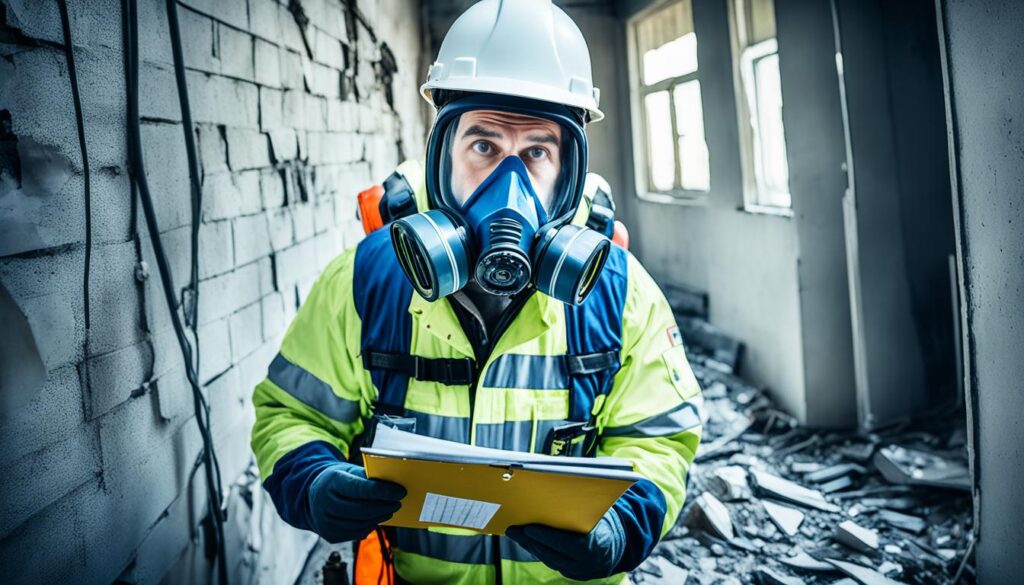An asbestos surveyor is key in keeping buildings safe. They conduct surveys to find and evaluate asbestos in materials. If we don’t know a building’s asbestos status, we might treat non-asbestos materials wrongly. This leads to extra costs. The survey results in a plan to manage asbestos. It tells us where asbestos is, how much there is, and its condition.
There are a few types of surveys done. These include management surveys and surveys before demolition or refurbishment. Surveyors carefully check the building and take samples for testing in a lab. Sometimes, they might test the air for asbestos particles.
They then write a detailed report. It lists all the asbestos found and how to handle it safely. Surveyors must have the right qualifications. They must follow rules and guidelines for their work.
Key Takeaways:
- An asbestos surveyor identifies and assesses asbestos-containing materials in buildings.
- Surveys help establish an asbestos management plan and provide crucial information about the presence and condition of asbestos.
- There are different types of asbestos surveys, including management, pre-demolition, and pre-refurbishment surveys.
- Asbestos surveyors collect samples for analysis and may conduct air testing to detect airborne asbestos particles.
- Their work must comply with industry guidelines and regulations.
How to Become an Asbestos Surveyor
If you dream of being an asbestos surveyor, you have a few paths ahead. Consider college, an apprenticeship, or learning while working. Most employers look for eagerness, a readiness to learn, and good listening skills more than specific qualifications. Yet, having certifications recognised by groups like the Royal Institution of Chartered Surveyors (RICS) is helpful.
You could also study for degrees or professional courses in surveying or engineering. These studies lay a solid foundation. They give you the key knowledge and skills needed in asbestos surveying.
There are special courses for those keen on delving deeper into asbestos surveying. Getting a Level 3 Award in Asbestos Surveying or a Level 4 Certificate in Asbestos Laboratory and Project Management is valuable. These programmes teach you the specifics of asbestos surveying.
Apprenticeships with surveying firms are another good route. They let you learn hands-on under skilled professionals. This way, you gain real experience and learn about asbestos surveying in depth.
Work experience in construction can also be beneficial. Whether it’s through school schemes or part-time work, it shows your dedication. It gives you practical insight into the industry.
When aiming to become an asbestos surveyor, honing specific skills is crucial. You’ll need training in asbestos survey methods, logical thinking to interpret data, and teamwork. Also, clear communication and understanding health and safety rules are important.
Requirements and Opportunities to Become an Asbestos Surveyor
| Path | Requirements | Opportunities |
|---|---|---|
| College Course | Relevant qualifications in surveying, construction, civil, or building engineering | Entry-level positions, further education |
| Apprenticeship | High school diploma or equivalent | On-the-job training, specialisation in asbestos surveying |
| On-the-job Training | Varies according to employer | Practical experience, potential for advancement |
| Professional Qualifications | Approved certifications by professional bodies like RICS | Enhanced employability, credibility, career progression |
With the right qualifications and experience, a successful career as an asbestos surveyor awaits. You’ll play a key role in ensuring buildings are safe. This ensures the health and safety of those inside or around them.

Conclusion
Asbestos surveyors are vital for keeping buildings safe. They check for materials that contain asbestos through detailed surveys. These surveys help create a solid plan to manage asbestos. They note where asbestos is and give advice on what to do if it’s found. There are different surveys for different needs.
To be a certified asbestos surveyor, there are several paths. You can study at university, start an apprenticeship, or learn while working. Having experience in the construction industry helps a lot. It teaches you about materials that contain asbestos and building safety rules.
If you get the right qualifications and experience, you can have a fulfilling career as an asbestos surveyor. You’ll help ensure buildings are safe and meet asbestos regulations. Your work will protect people’s health and maintain the safety of our buildings.
